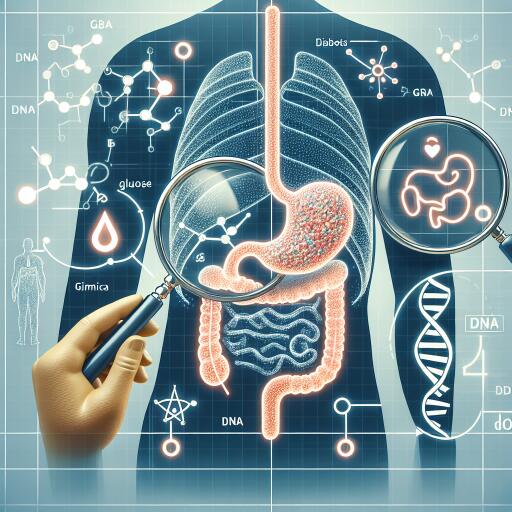Exploring the Genetic Link Between Type 2 Diabetes and Gastrointestinal Disorders
The complex interplay between genetic factors and chronic diseases such as type 2 diabetes (T2D) and gastrointestinal (GI) disorders is a growing area of interest within the medical research community. A recent study has made significant strides in uncovering the genetic overlap, causality, and shared biological pathways between T2D and various common GI disorders, including peptic ulcer disease (PUD), irritable bowel syndrome (IBS), gastritis-duodenitis, gastroesophageal reflux disease (GERD), diverticular disease, and a medicated phenotype for GERD/PUD (PGM), while notably excluding inflammatory bowel disease (IBD) from the shared genetic correlation.
Genetic Correlation and Causality
Utilizing summary statistics from several large-scale genome-wide association studies (GWAS), researchers conducted a comprehensive analysis to estimate both global and local genetic correlations between T2D and the named GI disorders. Through methods such as linkage disequilibrium score regression (LDSC) and Local Analysis of Variant Association (LAVA), they found significant positive genetic correlations across most disorders, except for IBD, where the correlation was negative.
Furthermore, Mendelian randomization (MR) analysis indicated a causal relationship between genetic liability to T2D and an increased risk of PUD, gastritis-duodenitis, and a bidirectional causality with GERD. These findings suggest that the genetic predisposition to T2D may directly influence the risk of developing certain GI disorders.
Gene-Level Genetic Overlap and Shared Pathways
At the gene level, the study revealed considerable overlap between T2D and the examined GI disorders, identifying several shared genes that reached genome-wide significance. This gene-based association analysis offers new insights into the specific genetic elements that may contribute to both T2D and GI disorders simultaneously.
Pathway-based analyses further illuminated the shared biological mechanisms underpinning these correlations, implicating several key biological pathways. These include leptin signaling in the context of T2D-IBD, thyroid and interferon signaling pathways for T2D-IBS, and pathways related to calcium anomalies for T2D and PUD. Other notable findings highlighted the roles of viral mechanisms, proinflammatory pathways, and immune-mediated processes across multiple disorders, reinforcing the complex relationship between T2D, GI disorders, and immune system interactions.
Implications for Future Research and Treatment
The extensive genetic analysis conducted in this study opens the door to more targeted investigations into the common mechanisms underpining T2D and GI disorders. By pinpointing specific genes and pathways shared by these conditions, researchers have laid a foundation for future studies aimed at unraveling the precise biological interactions at play. This could eventually lead to the development of more effective therapeutic strategies that address the root genetic causes of these diseases, rather than merely managing their symptoms.
Moreover, the findings stress the importance of considering the role of genetic predisposition in the clinical management of T2D and related GI disorders. Understanding the genetic overlap and causality relationships between these conditions could enhance predictive models, improve personalized treatment approaches, and potentially identify at-risk individuals before the onset of disease symptoms.
Conclusion
This groundbreaking study provides vital insights into the genetic connectivity and shared biological pathways between type 2 diabetes and various gastrointestinal disorders. The identification of causality, significant genetic correlations, and overlapping genes paves the way for advancements in understanding the underlying biological mechanisms. Such knowledge is crucial for the development of innovative treatment strategies and highlights the importance of genetic considerations in the management of T2D and GI conditions. With continued research in this direction, the hope is to eventually improve patient outcomes through tailored and genetically-informed healthcare interventions.










